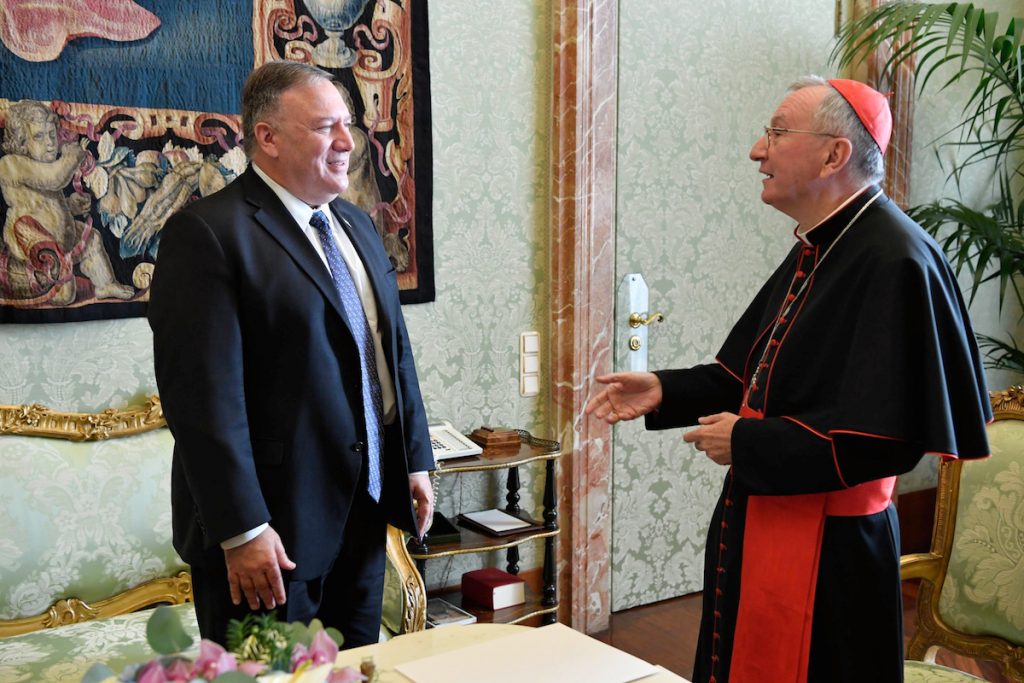Top Vatican officials called on global leaders to respect religious freedom even as they condemned “intolerant voices of the politically correct” that silence such liberty.
The church officials made the statement after US Secretary of State Mike Pompeo called on the Catholic Church to speak out against the human rights abuses in China.
In a symposium on international religious freedom in Rome on Sept. 30, Cardinal Pietro Parolin, Vatican secretary of state, said violation of religious freedom at the global level comes from “a fundamental misunderstanding of the meaning of human freedom.”
He said attacks on religious liberty are “often driven by fear and ideology” perpetuated by “totalitarian regimes that use power to impose draconian restrictions.”
The prelate said the world has seen countries and governments that prohibit the practice of religious traditions and actively persecute ethnic and religious minorities.
Cardinal Parolin, however, said that “the intolerant voices of the ‘politically correct’” also violate such freedom by trying to “silence and condemn those religious beliefs, traditions, and practices that clash with their progressive ideology, labeling them as ‘hateful’ and ‘intolerant.’”
“It is time that we reflect more seriously about the root of ‘intolerance’ in such situations and, in particular, the shrinking public space for dialogue for and with those that practice their beliefs openly,” said the prelate.
“Indeed, the degree of respect for freedom of religion in the public sphere is a clear indicator of the health of any society; and, it follows, therefore, that it is also a ‘litmus test’ for the level of respect that exists for all other fundamental human rights as well,” he added.
The prelate reminded the public that in the promotion of religious liberty through diplomatic activity, “it remains useful for us to remember not only of what we hope to defend and promote but also the threats that we face.”
He said these threats include “physical oppression, persecution, and ideological imposition.”
Archbishop Paul Gallagher, Vatican secretary for the relations with states, echoed Cardinal Parolin’s pronouncement, saying that “attacks against religious liberty are not only coming in the form of physical persecution but evermore through ideological trends.”
He said that attacks on religious liberty also emanates from “‘silencing’ through what has often been called ‘political correctness,’” which he claimed, “are taking ever larger liberties in the name of ‘tolerance’ and ‘non-discrimination.’”
The prelate stressed that the Holy See has been “assiduously and constantly attentive” to abuses of religious liberty.
He said the Vatican is fully aware of atrocities perpetrated by authoritarian and dictatorial regimes, which are “most vividly witnessed in those instances where there are physical persecution and even murder of religious minorities.”
Archbishop Gallagher said the Church also has its eyes on “ever more common tendency, especially found in the West, which promotes ideologies and even national legislation that conflicts with the exercise of religious liberty.”
“These inflexible ideologies, which are quick to denounce religious beliefs and persons that do not accept their position as ‘hateful,’ are themselves rather ‘intolerable’ and ‘discriminatory’ against the freedom of religion,” said the prelate.


Before the two top Vatican officials delivered their speeches, Pompeo addressed the same symposium, saying that “nowhere is religious freedom under assault more than it is inside of China today.”
Pompeo said the United States “can and does play its part in speaking up for those oppressed, although we too can do more.”
“But for all that nation-states can do, ultimately, our efforts are constrained by the realities of world politics,” he added.
Pompeo, however, said the Catholic Church is “in a different position,” adding, that “earthly considerations shouldn’t discourage principled stances based on eternal truths.”
He said history proves that it has been the Catholic Church that has “often deployed [its] principles in glorious, glorious service of human dignity.”
In an earlier interview with the Catholic News Agency, Pompeo said the Catholic Church has “an enormous amount of moral authority.”
“We want to encourage them to use that moral authority, to improve the conditions for believers, certainly Catholic believers, but believers of all faiths inside of China,” he said.
The US secretary of state was in Rome this week to seek an audience with Pope Francis on the eve of the renewal of the controversial agreement between Beijing and the Holy See.
The Vatican denied Pompeo’s request to meet the pontiff and accused him of trying to drag the Catholic Church into the US presidential election by denouncing its relations with China.
Pompeo earlier published an article accusing the Catholic Church of putting its “moral authority” at risk by renewing an agreement with China over the appointment of bishops.


